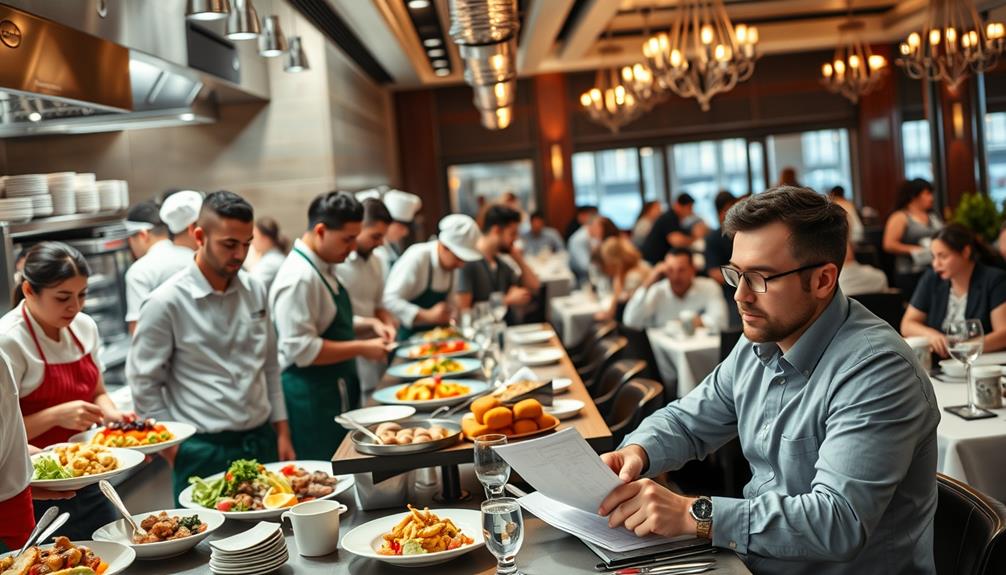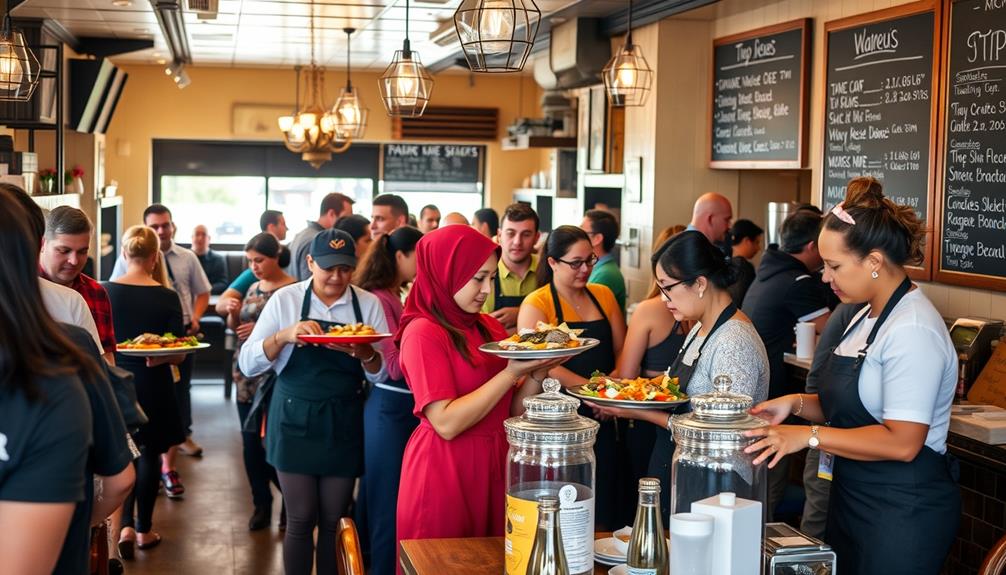As a restaurant owner in the U.S., you can expect to earn around $82,566 annually. However, your salary can vary greatly depending on where your restaurant is located, its size, and the type of establishment you run. For example, owners in high-demand areas like New York or Washington may see salaries exceeding $90,000. Smaller restaurants typically generate lower incomes, while upscale venues or multi-unit operators can bring in considerably more. Understanding these factors can help you better project your potential earnings in this dynamic industry. There's much more to this story that could impact your journey as an owner.
Key Takeaways
- The average salary for restaurant owners in the U.S. is approximately $82,566 per year.
- Salaries vary by location, with higher averages in states like Washington ($99,811) and New York ($90,983).
- Smaller restaurants tend to pay less, ranging from $24,000 to $60,000 annually, while upscale establishments may earn over $150,000.
- Restaurant owners should limit their salary to less than 50% of profits to ensure sustainability.
- Profit margins in the restaurant industry typically range from 3% to 5%, influencing overall earnings.
Average Salary Overview
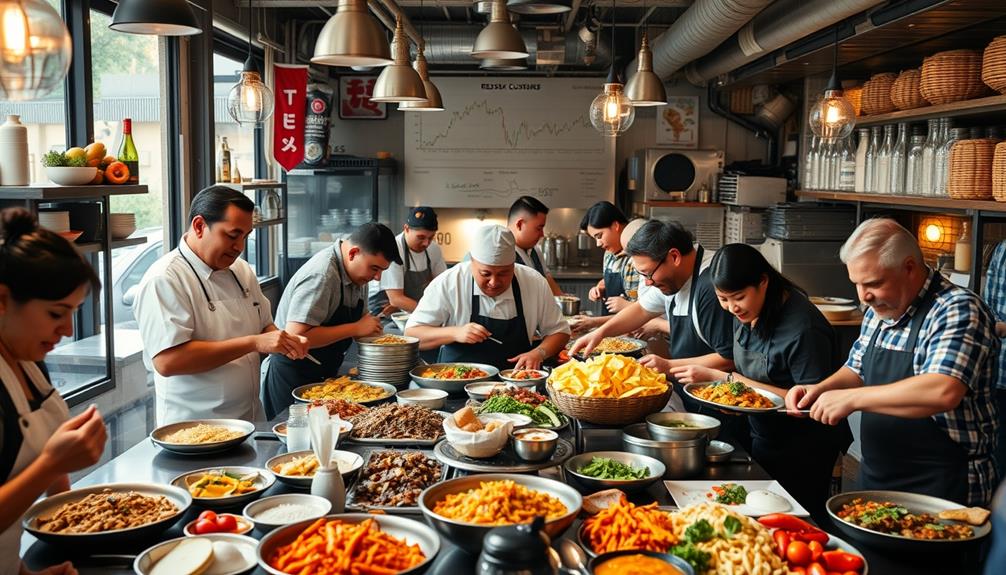
When you look at the average salary for restaurant owners in the U.S., it's around $82,566 per year, according to Indeed.com. This figure provides a solid benchmark, but keep in mind that salaries can vary considerably based on location.
For instance, in Houston, TX, restaurant owners earn about $80,989, which is 15% above the national average. Meanwhile, states like Washington and New York offer higher annual salaries, averaging $99,811 and $90,983, respectively. Understanding the importance of budgeting for expenses can help restaurant owners manage their finances effectively.
When evaluating the potential earnings, you might notice that salary ranges for restaurant owners can span from $24,000 to $155,000 annually. This wide gap often reflects differences in profit margin, restaurant size, and market demand.
While it's tempting to take a higher salary, the National Federation of Independent Business suggests that owners should ideally limit their salary to less than 50% of their profits. Understanding this average salary and how it relates to your specific location will help you set realistic financial expectations as a restaurant owner.
Factors Influencing Earnings
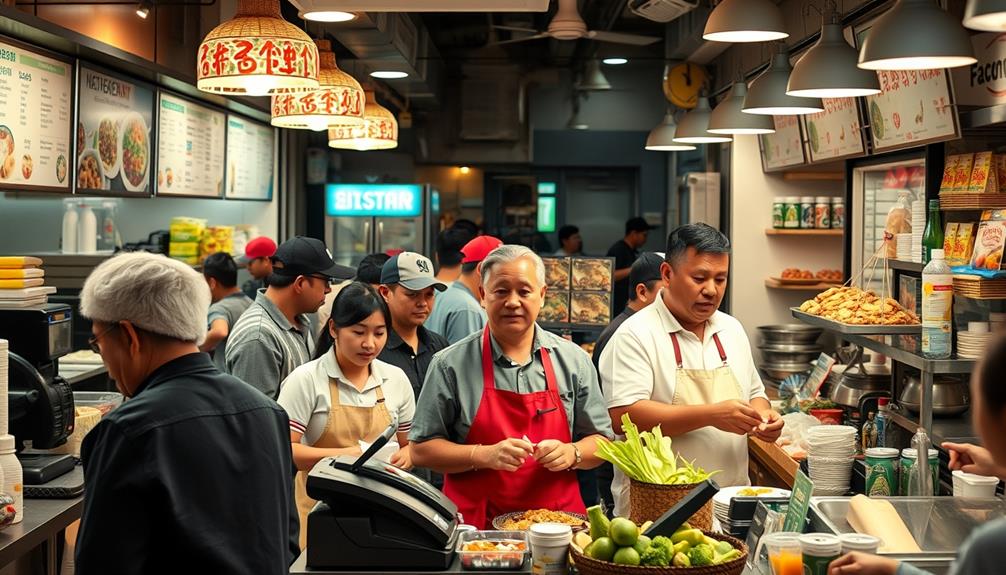
When you're looking at a restaurant owner's salary, several key factors come into play. Your earnings can vary greatly depending on the size of your establishment, the geographic location, and the type of restaurant you operate.
Additionally, factors such as market demand and competition can greatly influence profitability. Understanding these influences can help you make informed decisions about your business and potential income, especially when considering aspects like juice diets and their sustainability.
Company Size Impact
Company size often plays an essential role in determining restaurant owner salaries, with larger establishments generally offering more competitive compensation packages.
Restaurant owners earn typically higher salaries in bigger operations due to the benefits of economies of scale. In a city like Houston, TX, the average salary for a restaurant owner is around $80,989, heavily influenced by the size of the establishment and its operational efficiency.
Additionally, best ways to earn money online can help restaurant owners explore supplementary income opportunities. In larger restaurants, enhanced operational efficiency often leads to higher profit margins, allowing owners to take home more substantial earnings.
On the flip side, smaller restaurants may provide a more hands-on experience and flexible roles, but they often come with lower pay. Owners of these establishments can earn anywhere from $24,000 to $155,000 annually, depending on specific business performance and location.
Understanding the dynamics of company size is critical for you as a restaurant owner when negotiating your salary and planning for financial success.
The size of your restaurant can greatly impact not just your earnings but also your overall job satisfaction and growth potential in the industry.
Geographic Location Variability
Geographic location can greatly shape your earnings as a restaurant owner, often determining how much you can take home at the end of the day. In high-paying states like Washington, average salaries for restaurant owners reach approximately $99,811 annually. In contrast, less populated areas may yield considerably lower earnings, reflecting the direct impact of geographic location on your financial success.
Additionally, locations near popular attractions or resorts, such as those with top hotels featuring water parks, can drive higher foot traffic and customer demand, enhancing profitability.
Urban centers and tourist hotspots are gold mines for restaurant owners. They typically offer higher earnings potential due to increased foot traffic and demand. For instance, in Ocean City, NJ, restaurant owners make an average salary of $91,790, showcasing how local economic conditions influence income.
Moreover, the size of your restaurant matters; larger establishments in metropolitan areas often achieve higher sales volumes, which translates to increased owner compensation.
Keep in mind that seasonal fluctuations and regional culinary trends can also affect your earnings. Certain locations may experience peak profitability during specific times of the year, further emphasizing the importance of geographic location in your overall earnings strategy as a restaurant owner.
Restaurant Type Influence
The type of restaurant you own plays a vital role in determining your earnings. Your Restaurant Owner Salary can vary widely based on the establishment's category. For instance, if you run an upscale restaurant, you might earn $150,000 or more annually. In contrast, if you own a small independent restaurant, your average earnings may range from $29,000 to $60,000.
Additionally, the efficiency of operations can be influenced by factors such as advanced technology and management practices, which can impact on transportation and installation logistics. Multi-unit operators and franchise owners can see their salaries climb even higher, potentially reaching $200,000 or more due to operational efficiencies and economies of scale.
The restaurant type influence doesn't stop there; profit margins also fluctuate considerably. The average margin in the industry is about 3% to 5%, which directly affects your earnings based on sales and operational costs.
Specialty food businesses, like coffee shops and bakeries, can also shift the earnings landscape, with coffee shops raking in between $200,000 and $500,000.
Additionally, unique concepts like food trucks or ghost kitchens might've lower overhead costs but can yield different revenue streams compared to traditional dining establishments. Therefore, understanding these factors is essential for gauging your potential earnings as a restaurant owner.
Salary by Location
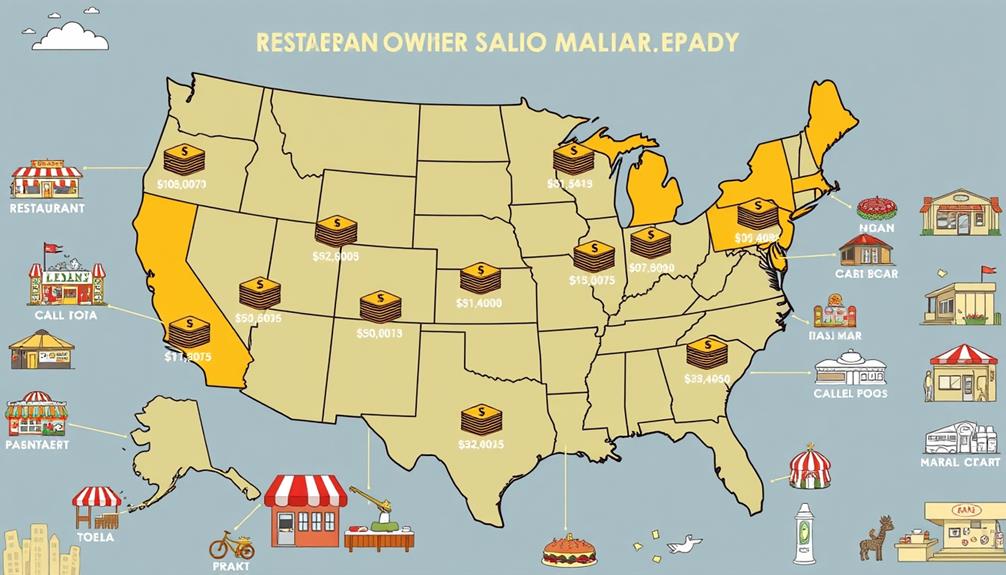
When you're considering becoming a restaurant owner, location plays a vital role in your potential earnings. States like Washington and New Jersey offer some of the highest average salaries, reflecting the demand and cost of living in those areas.
Additionally, understanding market research to pinpoint high-growth sectors can further impact your restaurant's success. This strategic approach can help you navigate the competitive landscape of the restaurant industry, particularly in areas with strong economic indicators like increased focus on sustainability.
Understanding these differences can help you make an informed decision about where to establish your restaurant.
High-Paying States Overview
If you're considering opening a restaurant, knowing where to set up shop can make a notable difference in your earnings. The average salary of a restaurant owner varies widely depending on the state, with some locations offering much higher pay than others.
Washington stands out as the top-paying state, where restaurant owners earn an impressive average salary of $99,811 annually. Additionally, understanding the economic factors influencing local industries, like the cruise industry, can provide insights into potential customer spending habits and preferences, as seen in cruise ship experiences.
In New York, you can expect to make about $90,983 per year. This reflects the state's competitive dining market, which offers plenty of opportunities for growth.
New Jersey isn't far behind, with restaurant owners earning an average of $90,806 annually, showcasing the region's thriving restaurant scene.
California also presents attractive earnings, with an average salary of $89,921, thanks to its diverse culinary landscape and high consumer spending.
Finally, Florida rounds out the list of high-paying states, where you can earn an average of $85,479 per year, driven by its vibrant food culture and tourism.
Choosing the right state to open your restaurant can notably impact your financial success.
City-Specific Salary Insights
Across various cities, restaurant owner salaries can differ markedly, impacting your potential earnings based on location.
For instance, if you're considering where to open your restaurant, you'll want to pay attention to the city-specific salaries available in the market. Additionally, understanding how different investment options can affect your overall financial strategy is essential, especially when considering Gold IRAs for retirement planning.
Here are some key insights:
- Florida restaurant owners average around $85,479 annually.
- California boasts an average salary of $89,921 for its restaurant owners.
- New Jersey and New York offer competitive salaries, averaging $90,806 and $90,983, respectively.
- Washington state tops the list with the highest average salary of $99,811 for restaurant owners.
- Ocean City, NJ, is notable with an average salary of $91,790, making it one of the highest-paying cities.
Understanding these figures helps you gauge how location influences your earning potential.
While the national average salary for restaurant owners is about $70,576, cities like Houston, TX, and states like New Jersey can provide considerably higher compensation.
As a result, carefully choosing your location can make a big difference in your financial success as a restaurant owner.
Company Size Impact

Understanding how company size impacts your salary as a restaurant owner is vital for making informed financial decisions. Generally, larger establishments tend to provide better salaries for restaurant owners. This is because the operational scale of these businesses usually correlates with increased revenue and profits, allowing them to offer more competitive compensation packages.
Additionally, larger restaurant operations often have more resources to invest in various financial strategies, such as diversifying assets through Gold IRAs, which can enhance long-term financial stability.
In contrast, if you're running a smaller restaurant, you might find that while your role may be more flexible, the pay is typically lower. This discrepancy arises from the limited financial resources that smaller establishments have to work with.
Location also plays a significant role in salary variations. In larger cities, for instance, you can expect higher earnings due to a broader customer base and increased sales volumes.
As you consider your restaurant's size and location, keep in mind that these factors will greatly influence your overall earnings.
To maximize your potential income, it's vital to understand the dynamics of company size. This knowledge will empower you when negotiating salaries and planning for long-term financial growth in your restaurant business.
Profit Margins Explained

Profit margins are a key factor in determining your financial success as a restaurant owner. Typically, the average profit margin in the restaurant industry ranges from 3% to 5%. This means that for every dollar in sales, only a small fraction is retained as profit after covering expenses.
To maintain a sustainable business, focus on the following:
- Monitor your Cost of Goods Sold (COGS) closely.
- Keep labor costs in check to avoid excessive expenses.
- Plan for unpredictable costs, like equipment failures.
- Base your salary on the net profit from the past 2-3 years.
- Avoid taking more than 50% of profits as personal salary.
Understanding your profit margins is vital, as they directly impact your ability to pay yourself a reasonable salary while ensuring the business remains financially healthy.
Additionally, successful restaurant owners often generate revenues exceeding $1 million annually, but achieving this requires diligent management of operational efficiency.
This is similar to how AI ethical considerations can influence business strategies in tech. Balancing profit margins and controlling expenses will set you on the path to long-term success in the restaurant industry.
Income Variability

Income variability is a significant reality for restaurant owners, directly influenced by factors like establishment type, market demand, and seasonal trends. Your average salary can range dramatically, from about $24,000 to $155,000 annually. This wide gap largely hinges on your restaurant's success and profitability.
New restaurants may pull in around $500,000 in their first year, but established ones can exceed $1 million annually. However, keep in mind that profit margins in the restaurant industry typically hover between 3% to 5%. This slim margin can greatly impact your take-home pay.
Seasonal business cycles also play an important role; you might find your monthly income fluctuating throughout the year, making it essential to manage finances and analyze sales data effectively.
Additionally, challenges like high employee turnover and unpredictable costs—such as equipment failures—can further complicate your financial landscape. These factors can directly affect your income and overall earnings as a restaurant owner.
Being prepared for these variations is imperative for maintaining profitability in the ever-changing restaurant industry.
Responsibilities of Restaurant Owners

As a restaurant owner, you wear many hats, and each one plays a significant role in your establishment's success. Your responsibilities are diverse, and mastering them is essential for running a profitable business.
- Concept Development: You create the restaurant's name, theme, cuisine, and menu, setting the foundation for everything that follows.
- Staff Management: You hire and supervise staff, ensuring they deliver quality service and maintain a positive customer experience.
- Financial Management: Keeping track of expenses, budgeting, and analyzing profit margins (typically 3% to 5% in the industry) is crucial for your restaurant's sustainability.
- Supplier Coordination: You work with suppliers to secure a consistent supply of ingredients, which directly impacts food quality and operational efficiency.
- Marketing Initiatives: You develop marketing strategies to attract and retain customers, aligning them with market trends and customer preferences.
Benefits of Ownership

Owning a restaurant not only brings a range of responsibilities but also offers numerous benefits that can make the hard work worthwhile. As the owner of a restaurant, you'll enjoy a level of creative freedom that few other professions can match. You get to curate the menu, design the interior, and shape the overall dining experience, allowing your culinary vision to shine.
Additionally, you can set your own operating hours and responsibilities, which allows for a better work-life balance that many aspire to. Successful restaurant owners earn significant financial rewards, with upscale establishments generating average annual incomes of $150,000 or more.
Being part of the restaurant community also means engaging with your local culture, fostering social interactions, and contributing positively to your neighborhood. This role opens doors to networking and collaboration opportunities within the industry, helping your business grow while providing valuable insights for continued success.
Ultimately, the benefits of ownership can make the long hours and challenges worthwhile, positioning you among the most profitable small businesses if you manage your restaurant effectively.
Major Challenges Faced

Running a restaurant comes with its fair share of challenges that can test even the most seasoned entrepreneurs. You need to navigate various hurdles that can affect not just your owners salary but also overall profitability. Understanding these challenges is vital to your success.
- High initial capital investments can be a significant barrier to entry.
- Labor shortages affect service quality and operational efficiency.
- Regulatory compliance adds to operational burdens and costs.
- Economic downturns reduce customer spending, squeezing profit margins.
- High employee turnover incurs replacement costs and impacts profits.
These factors can create a perfect storm for restaurant owners. When labor shortages strike, maintaining service quality becomes difficult, and customer satisfaction may take a hit.
Additionally, complex regulations can lead to costly compliance issues. During economic downturns, you might find that customers are less willing to spend, directly affecting your revenue.
Financial Management Strategies

Steering through the challenges of restaurant ownership requires more than just resilience; it demands a solid grasp of financial management strategies.
To succeed, you'll need to analyze your profit margins, which typically range from 3% to 5%. This analysis helps you set sustainable salary benchmarks and develop effective reinvestment plans.
Implementing accounting software can streamline tracking your expenses and profitability. You can calculate your profits using the formula: Sales Revenue – (Cost of Goods Sold + Overhead + Labor) = Profit.
Daily reviews of your Cost of Goods Sold (CoGS) are essential for managing ingredient costs, which directly affect your profit margins.
Customized sales forecasting can further enhance your inventory management, reducing food waste and optimizing orders. This approach not only improves overall profitability but also supports better decision-making.
Reinvesting surplus profits into business growth is vital; focus on expanding your restaurant before increasing your personal income. By doing so, you set the stage for a sustainable financial future as your restaurant matures.
Embracing these financial management strategies will empower you to navigate the complexities of ownership and enhance your restaurant's success.
Frequently Asked Questions
Do Restaurant Owners Make Good Money?
You might find that restaurant owners can make good money, but it varies widely. Their earnings depend on factors like location, restaurant success, and business model, so potential income ranges from modest to impressive.
How Much Would I Make if I Owned a Restaurant?
If you owned a trendy café in Seattle, you might earn around $99,000 annually. Your income would depend on your restaurant's success, location, and how effectively you manage expenses and profits.
Can a Restaurant Owner Be a Millionaire?
Yes, you can definitely become a millionaire as a restaurant owner. By strategically managing costs, optimizing operations, and reinvesting profits, you greatly increase your chances of achieving substantial wealth in the competitive restaurant industry.
How Profitable Is Running a Restaurant?
Running a restaurant's like walking a tightrope; profitability's often precarious. You'll navigate slim margins, initial losses, and fierce competition. But with smart strategies, you can turn those challenges into opportunities for growth and success.
Conclusion
In the wild world of restaurant ownership, your earnings can soar higher than a soufflé! While the average salary might leave you dreaming, your location, company size, and management skills can catapult you into culinary stardom. But remember, with great power comes great responsibility—juggling profit margins, fierce competition, and demanding customers. So, if you've got a passion for food and a knack for business, plunge in! Your restaurant empire awaits, and who knows? You might just become the next dining legend!
